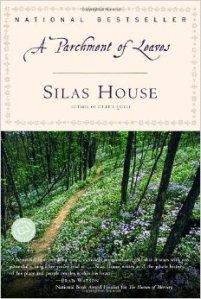Silas House's A Parchment of Leaves is a portrait of the tension of humanity. Woven with rich language, the text tells the story of a young couple trying to navigate the ties between families. They are asked several times to stretch beyond themselves to forgive past and present faults, and many times only the natural world can help them come to that realization. The novel is set in Kentucky during the early 1900s, when being Native American was not appreciated. A young man, Saul Sullivan, goes up the mountain looking for work but returns with a wife who is nothing like his mother expected. Vine, the young Cherokee girl who steals the heart of Saul, spends the next few years of her married life learning about family ties, forgiveness, and the hatred toward her people.
The connection to nature in this book made me want to be outside more and more, especially during the gloaming. Unfortunately I spent most of my time reading this book in an airport or inside. Like the characters I have often looked at nature as a connection to God, not in the sense that I speak to God through the trees but that the trees represent God's ability to create beauty. At one point, Vine wonders about the trees and says " They were like God in many respects: they stood silent, and most people only noticed them when the need arose. Maybe all the secrets to life were written on the surface of leaves, waiting to be translated." If we all spent more time pondering nature, I think we might understand God just a bit more or at least desire to be closer to him.
Family is huge theme in this novel. Amidst tough situations, Saul realizes that "All a man had in this life was his family, and he had to do his best by them. This was the think that would matter most to him when he lay upon his deathbed, taking inventory of his days on earth." At first Saul and Vine each try to cling tightly to their individual families, unwilling to see any faults in their own natural family and always running back when things got tough. They learn that while they can remain close to their own natural family they now have a new family by marriage.
I give this book a 5 out of 5. The story kept me entranced and the language was beautiful. I will leave you with one more quote from the novel that really sticks: "Words become solid on the air when spoken, but quickly drift away. Ink lasts always."
http://www.penguinrandomhouse.com/books/83293/a-parchment-of-leaves-by-silas-house/
Thanks to Martha S. for letting me borrow her book.
-Granny Eyre-

